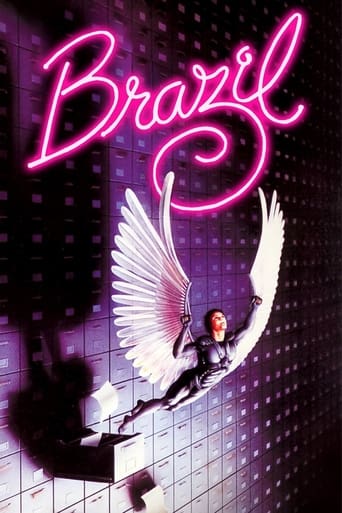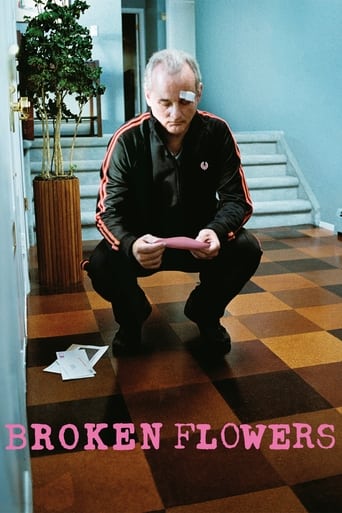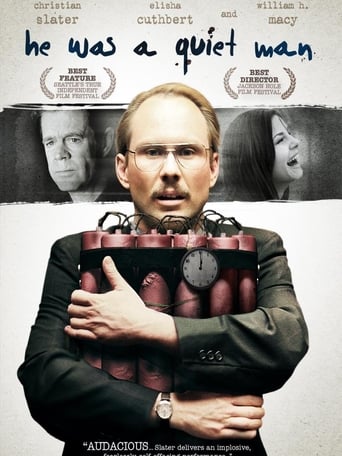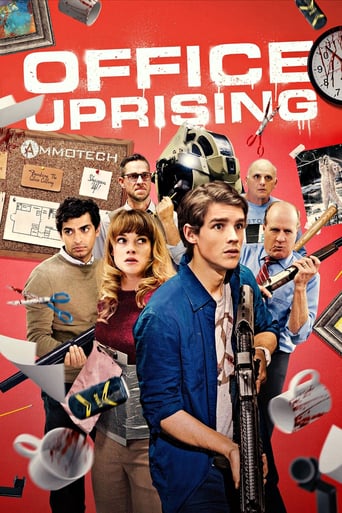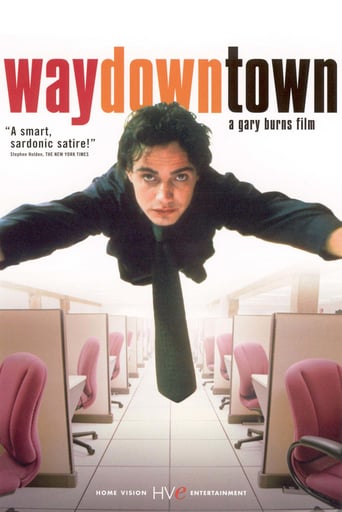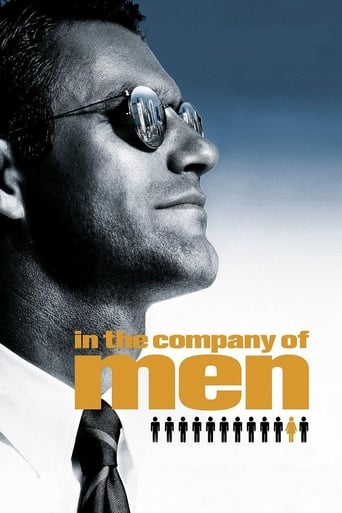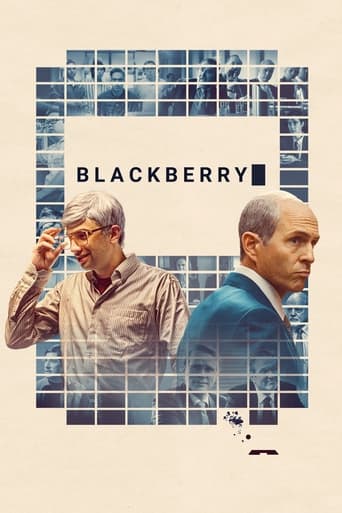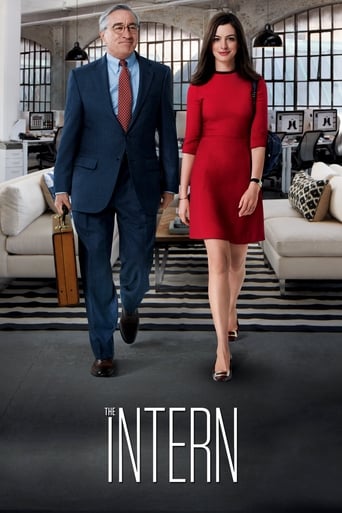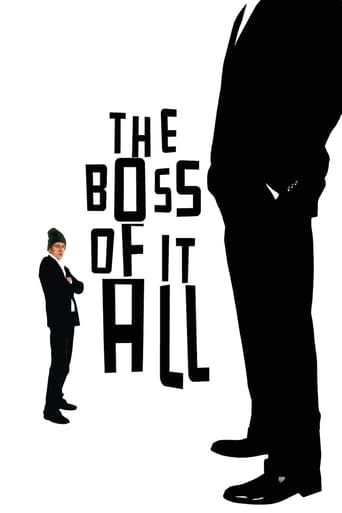
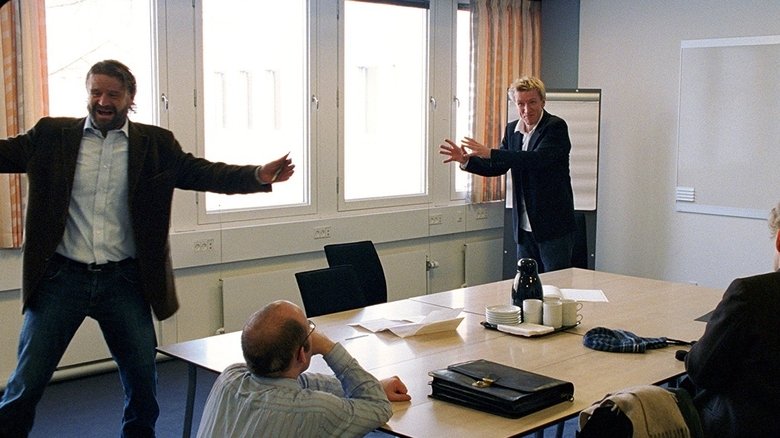
The Boss of It All (2007)
An IT company hires an actor to serve as the company's president in order to help the business get sold to a cranky Icelander.
Watch Trailer
Cast
Similar titles
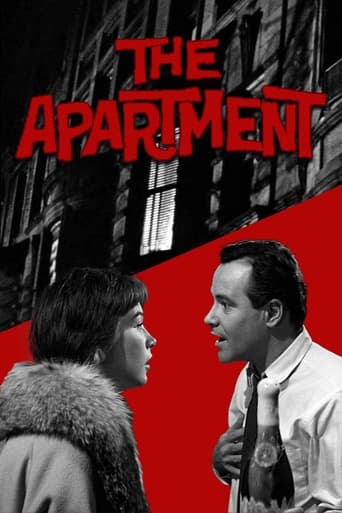

Reviews
It's the kind of movie you'll want to see a second time with someone who hasn't seen it yet, to remember what it was like to watch it for the first time.
There's no way I can possibly love it entirely but I just think its ridiculously bad, but enjoyable at the same time.
Exactly the movie you think it is, but not the movie you want it to be.
Worth seeing just to witness how winsome it is.
The fact that "The Boss of it All" is a strange film isn't unusual given it was directed by Lars von Trier. He's known for making unusual films and prides himself for his adherence to the posits of the so-called 'Dogma 95' film movement--one that makes many demands for its films, such as the story being placed in the present, the use of natural settings and the frequent use of hand-held cameras (among other things). The film begins unusually--with a narrator acknowledging that this is a film and making comments about the story and cinematography! It also ends in pretty much the same way and even has a point in the middle where more comments are made (presumably by von Trier). The story is about a very deceptive man. While Ravn appears to be a nice guy and his co-workers love him because he's 'like a cuddly bear', this is only a persona he puts on himself. Actually, he's a cutthroat businessman. Everyone thinks he's just a co-worker but he actually owns the company and has maneuvered everyone to sink their saving and energy into the company. But he's actually planning on selling his company to a group of Icelandic businessmen who HATE Danes and plan on firing everyone and making Ravn rich....and leaving his employees out in the cold with nothing! So how does he do this? He has created a fake boss--an absentee boss. But the folks who want to buy the company ALSO think there is such a boss. And, to finalize the deal, he needs to create a fake boss--a hatchet man who can sign off on the deal AND be blamed for everyone losing their jobs. To do this, he hires an out of work actor...but somehow his plan doesn't go as planned!Believe it or not, this movie reminds me of an episode of "Cheers" that debuted long before this movie. In it, Norm owned a painting company and none of his workers worked hard or had any respect for working-- so he created an alter-ego, Anton Keitzer, who was a nasty monster and intimidated the workers into doing their jobs! It's a funny idea and it works just fine in the film. While it is funny, it's not hilarious however and I have the feeling it could have been funnier-- particularly if von Trier had made the film in a more conventional style. Still, it's well worth seeing.
Ravn (Peter Gantzler) is a Danish entrepreneur who, due to an almost pathological need to be liked by everyone, has trouble effectively managing the employees who work for him. To overcome this deficiency, he devises an elaborate ruse, one that involves hiring an out-of-work actor (Jens Albinus) to pose as a fictitious company president whose job it will be to both bark out the orders and deflect any blowback that might come his way from the disgruntled workers. At first, Kristoffer goes along with the plan, convincing the staff that he is indeed the CEO of the firm and that he actually knows what it is he's talking about when it comes to implementing and enforcing company policy. Yet, slowly, Kristoffer comes to suspect that Ravn may not be quite as pure in heart or benign in his motives as the young actor was initially led to believe. Eventually, Kristoffer has to decide just how far he's willing to go with this charade if carrying it to its completion means backstabbing the very people he's actually come to care about in the short time he's been working there.Like virtually all of Lars Van Trier's work, the highly satirical "The Boss of it All," is an acquired taste, one that demands a degree of patience from the viewer - along with a rather high threshold for pretentiousness - before it can be fully understood and appreciated. And, indeed, the first half of the film makes for rather rough sailing as we attempt to descry, through all the verbal fog and cinematic obscurity, just what it is that Van Trier is trying to accomplish. We know it has something to do with skewering the whole corporate-world-mentality thing, but the extreme verbosity and self-conscious film-making style go a long ways towards muddling the message.But, damned if the whole thing doesn't somehow manage to pull itself together long about the midway point and we cruise safely to our admittedly unexpected destination. Part of the reason for the turnabout is that Van Trier is finally able to crystallize his theme once Kristoffer realizes he has a serious moral decision to make and when it starts becoming unclear which "boss" is really pulling the strings - i.e. who is the puppeteer and who the puppet, who the scenarist and who the actor - in this oddball relationship.I've never been overly fond of Van Trier's self-conscious stylistic hallmarks - jump-cuts, catawampus framing, self-referential, film-within-a-film narration - since they serve mainly to call attention to the filmmaker and to throw us out of the drama he's showing us. Still, there are moments when the dark, tongue-in-cheek humor successfully hits its mark, and Van Trier does a nice job dovetailing his parody of the theater into his satire on business. And the unexpected ending demonstrates that none of us is truly above selling out those we care for if the price is right for doing so.
What a wonderful surprise this film was! I never expected a pretty straightforward satire from von Trier and Dogme, but I certainly got it. The plot sounds well-used and obvious but the way it was transferred to a Scandinavian IT culture, the distanced approach to character writing, improvisation, and superb acting and direction made it a great comedy. On reflection, what was really hilarious was the massively over-inflated self-importance of each and every character. Ali G. and Borat could learn a few things from these Danes (and one very irate Icelander).As the end credits voice-over said, "Apologies to those who expected more, and to those who expected less. The others got what they deserved". I was glad to be one of the others.
Try this. Let's imagine you really want to see a movie. Maybe this one. Nothing wrong with that. But maybe it's also your turn to do some cleaning - you can't remember - but why risk argument or ill-feeling? You decide it was my idea to see the film together. It would be rude to refuse. You're a nice person after all.The owner of a Danish IT company wants to sell up. There is only one problem. When he started the company he invented an imaginary boss to take the rap for unpopular decisions. So no-one has ever met the 'boss of it all' until now. The Icelanders doing the buying insist on dealing with the actual boss. So he hires an actor.The actor, Kristoffer or 'Svend E' knows nothing about the company and finds the buyers are not the only ones he has to bluff convincingly. Over the years, he has 'sent' emails to the staff who start holding him responsible for what he has said - and of course he does not know what he's meant to have said. Ravn, the real owner, can't remember but there was some serious stuff going down. A hilarious screwball comedy, The Boss of It All also poses provocative moral dilemmas about how a boss can use fictions to mistreat workers.Even as a comedy, the film works on several levels. It starts with a basic comedy structure where we know something most of the characters don't. Kristoffer is the butt of the jokes but we want him to win. We want him to guess what he has supposed to have said and somehow turn it to his advantage. All this provides belly laughs at a gut level. Especially when he is accused of 'lousy acting' by a woman who does not know he is acting and means something else, or when he 'has' to have raunchy sex with her. (Even the sex scenes are convincingly real, even while they are excruciatingly funny.)For fans of von Trier's work, there are more subtle jokes. At the start, we hear von Trier's (uncredited) voice-over pointing out we can just about see his (physical) reflection. But the film, he says, is not worth a moment's reflection as it's comedy. It's as if someone had said, "Whatever you do, don't think of 'x'". Immediately, that's what you think about. Von Trier is the man who 'invented' Dogme95 cinema, the back-to-basics arbitrary rules that included 'The director must not be credited' - itself a pun on the theme of the film. Lines like, "Life is a Dogme film" make us wonder how serious von Trier is as a philosopher, or whether it's a joke at our expense. He can be a bit like the Kristoffer character who gleefully insinuates, "I'm better at being irritating on an intuitive level." Then there are jokes about Danes (who are traditionally afraid of conflict - it is very 'un-Danish to be 'bad cop') and gags that play on a historical power struggle between Denmark and Iceland. The many levels all work so fast that everyone can be laughing at something different at any one time.Structurally, the movie dazzles. It gets seriously into screwball mode and then every so often the Narrator returns to inject a Brechtian distance, reminding us that it is fiction, making us think about how it comments on the real world or insidious office politics. We feel a tension, a need to get away from serious thought and just find out what happens. The narrator bows to our desires and promises, god-like, to resolve the dramatic tensions. (Fans of Shakespeare will recall how the Bard would use a Narrator to draw attention to what we were experiencing and so encourage us to analyse it. The Narrator, in Shakespeare's plays, as in The Boss of It All, could be the true boss, telling us what is really happening beneath the surface.) And the dramatic ending will have you clinging to your seat. Hold on to your sides cos if you laugh too much you might miss something.Ever the creator of some new cinematic technique, von Trier has committed the movie's cinematography to a (published) mathematical formula and principle called 'Automavision'. This is designed to 'limit human interference' and free the work from the force of habit and aesthetics. As with Dogme95, no doubt half the film community will ask if he is serious while another sector will go off and studiously practice it. As an added fillip, Danish fans can play 'Lookey', to find hidden visual elements out of context in the movie and first winner gets to be an extra in the next film. Von Trier has also devised a new ascetic aesthetic to 'rediscover his original enthusiasm for film.' And he's tired of playing 'bad cop' in professional relationships while other people get to be 'good cop' and nice to everyone, yet this master of intellectual creation has taken the experience as inspiration for the film, "poking fun at artsy-fartsy culture."They sometimes say that if God didn't exist you'd have to invent him. Sometimes you just need to know who you are dealing with. You need The Boss of it All. At least in this film Lars von Trier credits himself as Director. Not since The Five Obstructions has the question of authorship been so seriously questioned. Even the character of the actor, who wields enormous power, has to consult his 'character' on how things should proceed.From such serious polemics as Dogville and Manderlay, the cowboy romp of Dear Wendy, the quasi philosophy of The Idiots, and the serious mainstream challenges of Dancer in the Dark and Breaking the Waves, one of the most original creative forces in contemporary cinema has turned his technical genius to pure comedy. Gainsayers will still call him pretentious, but they may laugh their socks off before they find out who's telling the joke.



